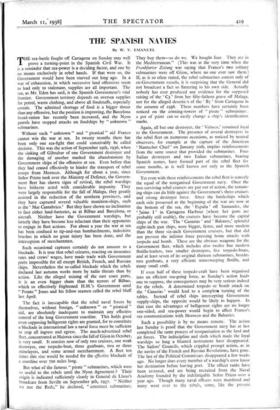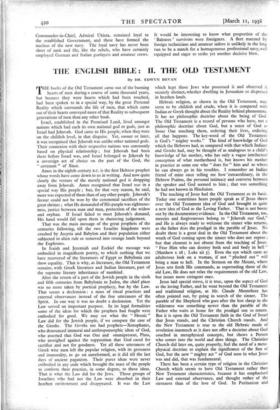THE SPANISH NAVIES
By W. V. EMANUEL
THE sea-battle fought off Cartagena on Sunday may well prove a turning-point in the Spanish Civil War. It is a reminder that sea-power is a deciding factor, and one by no means exclusively in rebel hands. If that were so, the Government would have been starved out long ago. In a war of exhaustion, in which successive land offensives seem to lead only to stalemate, supplies are all important. The sea, as Mr. Eden has said, is the Spanish Government's vital frontier. Government territory depends on oversea supplies for petrol, warm clothing, and above all foodstuffs, especially cereals. The admitted shortage of food is a bigger threat than any offensive, but the position is improving, the Barcelona bread-ration has recently been increased, and the Nyon patrols have stopped attacks on foodships by " unknown " submarines.
Without such " unknown " and " piratical " aid Franco cannot win the war at sea. In twenty months there has been only one sea-fight that could conceivably be called decisive. This was the action of September 29th, 1936, when the sinking off Gibraltar of one Government destroyer and the damaging of another marked the abandonment by Government ships of the offensive at sea. Even before that they had ceased effectively to hinder the transport of rebel troops from Morocco. Although for about a year, since Seiior Prieto took over the Ministry of Defence, the Govern- ment fleet has shown signs of revival, the rebel warships have hitherto acted with considerable impunity. They were largely responsible for the fall of Malaga, they greatly assisted in the reduction of the northern provinces, and they have captured several valuable munition-ships, such as the ` Mar Cantabrico.' But they have shown no inclination to face either land-batteries, as at Bilbao and Barcelona, or aircraft. Neither have the Government warships, but latterly they have become less reluctant than their opponents to engage in fleet actions. For about a year the war at sea has been confined to tip-and-run bombardments, indecisive brushes in which no great injury has been done, and the interception of merchantmen.
Such occasional captures certainly do not amount to a blockade. It is true that rebel seizures, reacting on insurance rates and crews' wages, have made trade with Government ports impossible for all except British, French, and Russian ships. Nevertheless the so-called blockade which the rebels declared last autumn works more by radio threats than by action. Like the alleged mining of the east coast ports, it is an even bigger sham than the terrors of Bilbao, which so effectively frightened H.M.'s Government until " Potato " Jones and his fellow seamen called the rebel bluff last April.
The fact is inescapable that the rebel naval forces by themselves, without foreign, " unknown " or " piratical " aid, are absolutely inadequate to maintain any effective control of the long Government coastline. This holds good even supposing belligerent rights are granted, for to constitute a blockade in international law a naval force must be sufficient to stop all ingress and egress. The much-advertised rebel fleet, concentrated at Majorca since the fall of Gijon in October, is very small. It consists now of only two cruisers, one weak destroyer, one torpedo-boat, three gunboats, two or three minelayers, and some armed merchantment. A fleet ten times this size would be needed for the effective blockade of a coastline over 70o miles long.
But what of the famous " pirate " submarines, which were so useful to the rebels until the Nyon Agreement ? Their origin is indicated sufficiently clearly in General de Llano's broadcast from Seville on September 9th, 1937. " Neither we nor the Reds," he declared, " construct submarines. They buy them—so do we. We bought four. They are in the Mediterranean." (This was at the very time when the Frankfurter Zeitung was saying that Franco's two solitary submarines were off Gijon, where no one ever saw them.) If, as is so often stated, the rebel submarines consist only of ex-Government vessels, it is surprising that the General did not broadcast a fact so flattering to his own side. Actually nobody has ever produced any evidence for the supposed raising of the C3 ' from her fifty-fathom grave off Malaga, nor for the alleged desertion of the ` B5 ' from Cartagena in the autumn of 1936. These numbers have certainly been noticed on the conning-towers of " pirate " submarines : a pot of paint can so easily change a ship's identification marks.
Again, all but one destroyer, the ` Velasco,' remained loyal to the Government. The presence of several destroyers in the rebel fleet on numerous occasions, as noticed by neutral observers, for example at the capture of the American Nantucket Chief' on January loth, implies reinforcements from the same source that provided the submarines. Four Italian destroyers and two Italian submarines, bearing Spanish names, have formed part of the rebel fleet for some months, as is well known not only to the Spanish Government.
Yet even with these reinforcements the rebel fleet is scarcely the equal of the reorganised Government navy. Once the two surviving rebel cruisers are put out of action, the remain- ing ships can do little against the Government's three cruisers and strong destroyer force. Since the battleships which each side possessed at the beginning of the war are now at the bottom of the sea, the Espana' off Santander, the Jaime I ' in Cartagena Harbour (where her guns are probably still usable), the cruisers have become the capital ships of the war. The Canarias ' and Baleares,' splendid eight-inch gun ships, were bigger, faster, and more modern than the three six-inch Government cruisers, but that did not prevent the inferior force pressing home attacks with torpedo and bomb. These are the obvious weapons for the Government fleet, which includes also twelve fine modern flotilla-leaders, two smaller destroyers, five torpedo-boats, and at least seven of its original thirteen submarines, besides two gunboats, a very efficient minesweeping flotilla, and many small craft.
If even half of these torpedo-craft have been organised into an efficient sea-going force, as Sunday's action leads one to suppose, the consequences may be very serious indeed for the rebels. A determined torpedo or bomb attack on the Canarias ' would lead to a complem turning of the tables. Instead of rebel ships intercepting Government supply-ships, the opposite would be likely to happen. In that case the advantages of belligerent rights are no longer one-sided, and sea-power would begin to affect Franco's sea communications with Morocco and the Balearics.
Such a possibility is by no means remote. The action last Sunday is proof that the Government navy has at last completed the same process of reorganisation as the land and air forces. The indiscipline and sloth which made the loyal warships so long a blunted instrument have disappeared. The Sailors' Councils, which crippled prompt action, as in the navies of the French and Russian Revolutions, have gone. The last of the Political Commissars disappeared a few weeks ago. No longer does every member of a warship's crew know her destination before leaving port. The officer ranks have been restored, and are being recruited from the Naval Academy founded by the indefatigable Senor Prieto over a year ago. Though many naval officers were murdered and many went over to the rebels, some, like the present Commander-in-Chief, Admiral Ubieta, remained loyal to the established Government, and these have formed the nucleus of the new navy. The loyal navy has never been short of rank and file, like the rebels, who have certainly employed German and Italian gunlayers and amateur crews. It would be interesting to know what proportion of the ' Baleares ' survivors were foreigners. A fleet manned by foreign technicians and amateur sailors is unlikely in the long run to be a match for a homogeneous professional navy, wel l equipped and eager to strike yet another decisive blow.











































 Previous page
Previous page